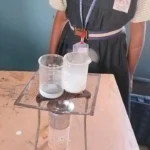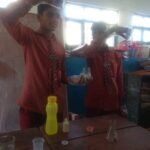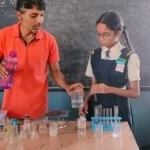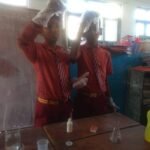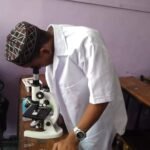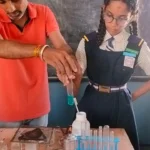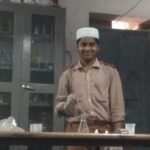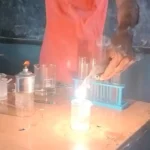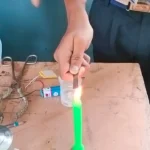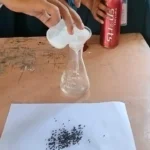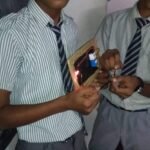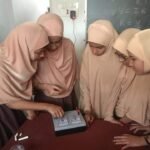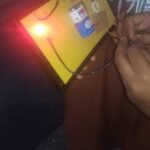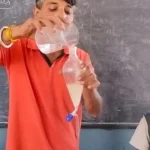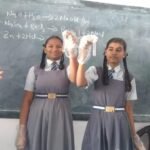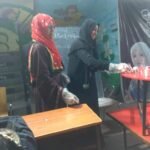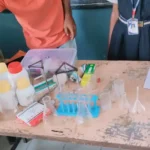Erudite Labs
Class 9 Lab Activities List
Class 9 Physical Science:
Session – 1:
Chapter 1: Matter Around Us
- Shape and Volume of Solid, liquid and gas
- Compressibility of Solid, liquid and gas.
- Diffusion of Solid, liquid and gas
- Diffusion of Ammonia gas and HCl gas
- Dilution of Liquids and particle size
- Space between particles and solubility
- Unsaturated, Saturated, Supersaturated Solution
Chapter 2: Motion
- Calculating velocity of an object
- Calculating velocity of a ball on an inclined plane.
Chapter 3: Laws of Motion
- Acceleration and velocity of an object moving on an inclined track
- First law of motion (Inertia)
- Inertia of rest
- Inertia of Motion
- Second law of motion
- Third law of motion
Session – 2:
Chapter 4: Refraction of Light at Plane Surfaces
- Refraction of light through water
- Refraction of light from denser to rarer medium
- Refraction of light from rarer to denser medium
- Refraction of light through glass slab
- Finding refractive index of glass slab
- Finding refractive index of water
- Obtaining a relation between angle of incidence and angle of refraction
- Total Internal Reflection
Chapter 5: Gravitation
- Finding the force of gravity
- Calculating mass of the substance with a Newton meter.
- Centre of gravity of objects
- Observing the changes during the free-fall of a body
- Finding center of gravity of an object
- Shift of the center of gravity and its effects
Session – 3:
Chapter 6: Is Matter Pure
- Preparation of saturated and unsaturated solutions
- Factors affecting the rate of dissolving
- Suspension and colloid
- Tyndall effect
- Separation of components of mixture by sublimation
- Process of evaporation of water
- Paper Chromatography
- Separation of immiscible and miscible liquids
- Separation of two miscible liquids by distillation
Chapter 7: Atoms, Molecules And Chemical Reactions
- Change in the mass before and after a chemical reactions
- Chemical Combination (Burning of magnesium ribbon)
- Chemical Combination (Reaction of CaO with water)
- Decomposition Reaction (Heating of calcium carbonate and emission of Carbon Dioxide)
- Decomposition Reaction (Heating of lead nitrate and emission of nitrogen dioxide)
- Electrolysis of water
- Displacement reaction(Reaction of dil.HCl with Zn granules)
- Displacement reaction(Iron nail and copper sulfate solutions)
- Double displacement reaction(lead iodide and potassium nitrate)
Session – 4:
Chapter 8: Floating Bodies
- Comparing density and relative density
- Finding the density of different objects
- Finding the relative density of different objects
- Find the relative density of milk, groundnut oil and kerosene
- Making of lactometer
- Measuring the weight of the water displaced by the immersed stone
- Pascal’s principle
Chapter 10: Heat
- Transfer of heat energy from hot body to cold body
- Thermal equilibrium-heat
- Temperature and Kinetic energy
- Specific Heat of liquids
- Method of mixtures
- Evaporation and factors affecting evaporation
- Condensation of water vapour
- Melting
Chapter 12: Sound
- Observing vibrations of sound
- Production of sound
- Propagation of Sound
- Demonstrating types of wave propagation
- Demonstrating wavelength, amplitude, time period and frequency.
- Sound reflection
- Amplification of sound using Stethoscope and working principle.
Class 10 Biological Science:
Session – 1:
Chapter 1: Cell – Structure and Functions:
- Structure of plant cell using Plastic model and microscopic observation
- Structure of plant cell using Plastic model and microscope
- Slide making and Observing Cheek cell under microscope
- Slide making and Observing Onion Peel under microscope
- Observing Cell division under microscope
Chapter 2: Plant Tissues:
- Observing Cheek cell under microscope.
- Observing Onion Peel under microscope.
- Observing plant leaf under microscope
- Slide making and Observing root tip under microscope
- Meristematic tissue.
- Dicot stem (TS) – Tissues Xylem and Phloem
- Monocot stem (TS) – Tissues Xylem and Phloem
- Dicot root (TS) – Tissues Xylem and Phloem
- Monocot root (TS) – Tissues Xylem and Phloem
- Peel of Rheo leaf – Dermal tissue and stomata complex
- Observing Parenchyma, Collenchyma and Sclerenchyma under microscope
- Observing Chlorenchyma, Aerenchyma and Storage parenchyma under microscope
Session – 2:
Chapter 3: Animal Tissues
- Epithelial Tissue under microscope
- Blood under microscope
- Muscle under microscope
- Observing Squamous , Columnar, Cuboidal epithelium cells
- Blood grouping
- Observing Striated muscles Non-striated muscles Cardiac muscles.
- Nerve cell using Plastic model
Session – 3:
Chapter 4: Transportation through Plasma Membrane
- Diffusion Activity
- Osmosis activity
- Filtration Activity
- Preparing a semi permeable membrane
- Diffusion with coffee powder
Chapter 5: Diversity in Living Organisms
- Monocot plant & Dicot plant Physical Observation
- Observing Bacteria under microscope from various sources.
- Observing Euglena under microscope
- Observing Amoeba under microscope
- Observing Paramoecium under microscope
- Bread mould, Mushroom, Yeast uder microscope.
- Tapeworm and Roundworm
- Plant and animal cell under microscope.
- Mitosis under microscope
Session – 4:
Chapter 6: Sense Organs
- Human eye schematic cross sectional view using plastic model
- Human ear schematic cross sectional view using plastic model
- Human Nose schematic cross sectional view using plastic model
- Human Tounge schematic cross sectional view using plastic model
- Human Structure of the skin schematic cross sectional view using plastic model
========================================
========================================
Class Wise Activities Brochure
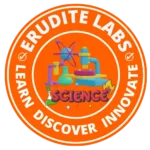
Demo Registration Form

